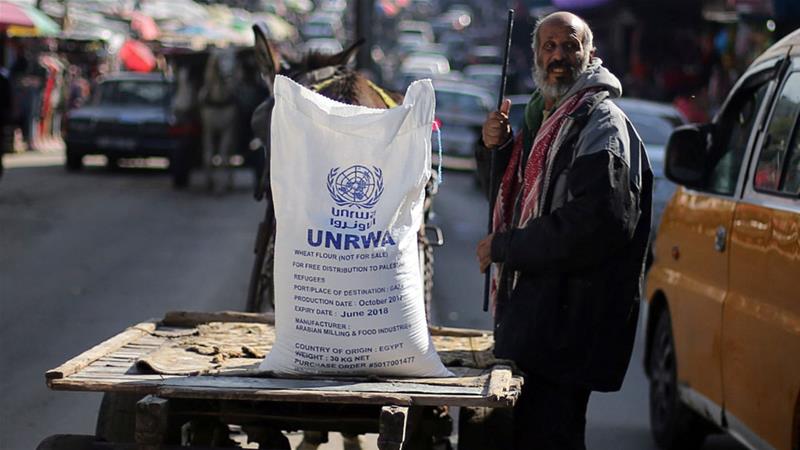Australia/Israel Review, Featured
Editorial: Refugees Forever?
Sep 20, 2018 | Colin Rubenstein

The Trump Administration’s recent decisions to stop funding the United Nations Relief and Works Agency for Palestine Refugees (UNRWA) and close the Palestine Liberation Organisation’s mission in Washington may appear, prima facie, hostile to Palestinians.
In reality, however, if responded to in the correct spirit, these moves could potentially be the catalyst for positive, empowering steps that encourage the Palestinian leadership to shed unhealthy rejectionism and unsustainable financial dependencies and redirect their energies towards bettering the lives of their people.
For instance, consider UNRWA and the situation of the 5.3 million Palestinian “refugees” it looks after.
While UNRWA provides a variety of humanitarian services such as education and healthcare to these refugees – overwhelmingly descendants of since-deceased refugees of the Arabs’ 1948 war against partition – this aid comes with the baggage of the agency’s politicisation and exploitation of the refugee issue.
And the most important consequence of that baggage is that, after 69 years, generations of Palestinian families are still condemned to live as refugees, apparently forever, together with all their descendants.
UNRWA, unlike the UN refugee agency (UNHCR) which handles all of the world’s other refugee crises, has no mandate to resettle a single refugee and perpetuates the conflict by using its own unique definition of refugee that includes those descendants and even millions of Palestinians who have full Jordanian citizenship. Remarkably, UNRWA has continued to maintain refugee camps in Palestinian-ruled areas and provide services to families who have moved out of such camps and into the Palestinian Authority (PA).
What began as an initiative to improve the quality of life for refugees has become an organisation which principally exists to safeguard the Palestinian claim of a so-called “right of return” to pre-state Israel and educate new generations of Palestinians to cling to this false hope.
Given that every descendant of a refugee is also a refugee under UNRWA’s definition, and no one can ever cease being a Palestinian refugee except by dying, the number of Palestinian refugees is slated to continue growing indefinitely as it has for the past 69 years – and so are the demands on donors to fund aid for these refugees. At some point, this was always going to become unsustainable.
Indeed, UNRWA’s unsustainable, perpetually growing demand on donors was cited by the US State Department as a primary reason for opting out of continuing to fund UNRWA.
Moreover, by discouraging Palestinians from living normal lives in the name of preserving the legally baseless and historically unprecedented “right of return” to Israel – a “right” virtually impossible to imagine ever being implemented – UNRWA is a trap for the refugees it serves.
Thus, in a recent op-ed, Israeli peace activist and former Labor cabinet minister Yossi Beilin called the US decision to stop funding UNRWA “just”, because as long as UNRWA exists, Palestinians can never be “emancipated” from their “refugee-dom”. Yet internal politics at the UN have always shielded UNRWA from reform.
“For the Palestinian leadership [and] the leaders of the Arab world,” Beilin wrote, “there is nothing more unifying than paying lip service to the right of return, a right they know full well will never be realised.”
UNRWA can’t even clearly claim to represent the will of the Palestinian public on the “right of return” issue. In January, the latest annual poll by the Palestinian Center for Policy and Survey Research found that 62% of those surveyed would support a two-state peace agreement that resolved the refugee issue through compensation.
Meanwhile, the US decision to close the PLO’s mission in Washington also fits into a larger policy of reworking the untenable Middle East status quo.
The closure order was anything but hasty, coming many months after the PLO announced it would cut ties with the White House and had preemptively rejected the anticipated Trump peace plan, dubbed the “deal of the century”, sight unseen.
US legislation is actually clear that the closure is a required consequence of Palestinian behaviour. Under a 1987 law, the PLO is only allowed to operate in the US if the President signs a waiver certifying that its operation there “is important to the national security interests” of the US. Subsequent laws in 2011 and 2015 dictate the President cannot issue such a waiver unless one of two things is true – he can certify that the Palestinians are not promoting, supporting, or endorsing action against Israel at the International Criminal Court (ICC) or the Palestinians have entered into “direct and meaningful negotiation with Israel.”
It is simply a fact that neither of these provisos are true today. The PA is trying to take Israel to the ICC and has not engaged in even the pretence of direct negotiations with Israel since 2014. So both as a legal and political issue, under such circumstances, the US could not countenance Palestinian officials undermining the White House and feverishly lobbying foreign ambassadors against American policies in the shadow of the Capitol, in defiance of US law.
The Trump Administration’s moves are clearly intended to pressure the Palestinian leadership, and transform a frozen and unpropitious status quo. While that may feel threatening to many Palestinians, it also provides an opportunity to improve future Palestinian prospects.
State-building, integration and resettlement of the “refugees”, and much increased self-reliance, are all possibilities which are open in principle to the Palestinians if the damaging current logjam, constructed from 70 years of unhelpful myths and counterproductive institutions like UNRWA, is overcome.
Sadly, historically, the Palestinian leadership have had a poor record for seizing such opportunities when they are presented to them.
With PA President Abbas’ tenure in power clearly coming to an end, a new leadership could theoretically seize this opportunity for constructive, transformative change away from an unproductive status quo.
Tags: Israel, NGOs, Palestinians, United Nations, United States






